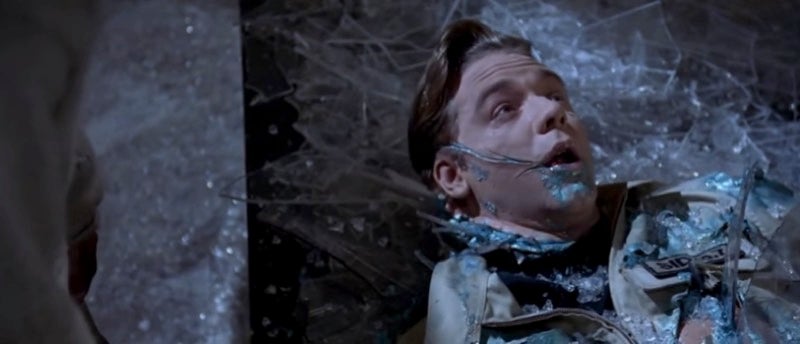
When it was released in 1995, Virtuosity (from director Brett Leonard, who’d already explored virtual reality in 1992's Lawnmower Man) was a bomb, despite the star power of Denzel Washington and an up-and-comer named Russell Crowe. In 2016, it’s now hilariously dated—but that actually makes it way more entertaining to watch.
So, the LAPD is developing a VR program to train its officers, with convicts serving as guinea pigs. Washington plays Parker, an ex-cop who’s doing time for killing the terrorist who murdered his wife and daughter, who becomes one of the test subjects. There are already some obvious flaws with this plan; it seems a wee bit impractical, not to mention majorly cost-prohibitive. But the worst part is that the “game” was designed by a mad scientist who modeled its constantly evolving antagonist after history’s worst criminals, including Hitler, Manson, and (of course) the dude who killed Parker’s family.
This villain (played by Crowe) is named SID 6.7, which stands for “Sadistic, Intelligent, Dangerous.” It takes, oh, 30 minutes into Virtuosity for SID 6.7 to emerge buck naked from VR-land and begin terrorizing the real world. Just like in the game, Parker is dispatched to bring him in, only this time he has a Snake Plissken-style “do or die” implant under his skin.
That said, SID 6.7 isn’t actually “real.” Physically, he’s an android/Terminator thing that can heal from bullet wounds, regenerate missing limbs, etc. by touching or eating glass. He favors tacky suits, like a comic-book villain. And since he’s interactive by design, he’s obsessed with being in the spotlight—which, in the era before cell phones, social media, or even the widespread use of the internet—means he has to do things like take over a TV station to get attention.
There’s also an incredibly bizarre scene in which SID 6.7 bursts into a packed nightclub where Traci Lords is performing and a robot is bartending, and proceeds to conduct a “symphony” of screams:
Why? Nobody knows why. Nobody can even guess (except maybe screenwriter Erik Bernt, who went on to write Romeo Must Die and Highlander: Endgame). It’s scenes like the above that make sure Virtuosity is never just a cop-chases-crook movie, or even a straightforward revenge flick.
Admittedly, it is still both of those things, and it plays into all the cliches you’d expect. Like, as soon as criminologist Kelly Lynch’s precocious daughter appears (she’s played by future Big Bang Theory
As such, it’s stuffed with important-sounding yet impenetrable cyberbabble; the enjoyment of watching a very chill Washington go up against a gleeful, scenery-chomping young Crowe; and many, many WTF moments (sure, a cheery “This one’s for you!” makes perfect sense as an evil catch phrase). Plus, who put a mad scientist in charge of this project in the first place? These factors help explain why Virtuosity was such a flop in 1995. But they’re also precisely why viewing it today is such a scream.